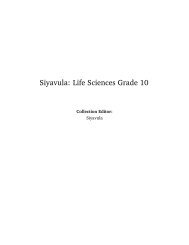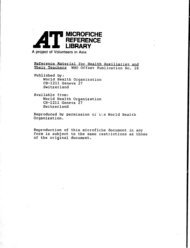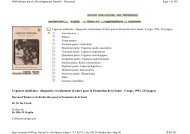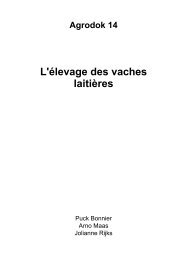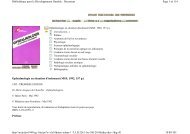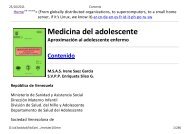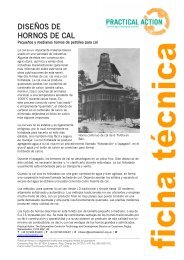- Page 2 and 3:
®{je ^. % ^iU lltbrarg lSV3t6 G48
- Page 7 and 8:
Digitized by the Internet Arciiive
- Page 9:
THE HISTORY OF SILK, COTTON, LINEN,
- Page 13 and 14:
PREFACE. History, until a recent pe
- Page 15 and 16:
PREFACE. Vll How many of the grande
- Page 17 and 18:
PREFACE. jx life from the paintings
- Page 19 and 20:
COINTENTS. PART FIRST. ANCIENT HIST
- Page 21 and 22:
CONTENTS. Xlll fiilk-worra never br
- Page 23 and 24:
CONTENTS. XV silk-worms of India—
- Page 25 and 26:
CONTENTS. Xvii Pliny's account of S
- Page 27 and 28:
CONTENTS. Xix PART THIRD. ANCIENT H
- Page 29 and 30:
CONTENTS. XXI APPENDICES APPENDIX A
- Page 31:
LIST OF PLATES. I. Frontispiece—C
- Page 34 and 35:
2 CULTIVATION AND MANUFACTURE OF va
- Page 36 and 37:
4 CULTIVATION AND MANUFACTURE OF fe
- Page 38 and 39:
6 CULTIVATION AND MANUFACTURE OF st
- Page 40 and 41:
: 8 CULTIVATION AND MANUFACTURE OF
- Page 42 and 43:
10 CULTIVATION AND MANUFACTURE OF t
- Page 44 and 45:
12 CULTIVATION AND MANUFACTURE OF T
- Page 46 and 47:
14 CULTIVATION AND MANUFACTURE OF S
- Page 48 and 49:
16 CULTIVATION AND MANUFACTURE OF T
- Page 50 and 51:
18 CULTIVATION AND MANUFACTURE OF g
- Page 52 and 53:
20 CULTIVATION AND MANUFACTURE OF W
- Page 54 and 55:
CHAPTER II. HISTORY OF THE SILK MAN
- Page 56 and 57:
24 CULTIVATION AND MANUFACTURE OF O
- Page 58 and 59:
26 CULTIVATION AND MANUFACTURE OF I
- Page 60 and 61:
28 CULTIVATION AND MANUFACTURE OP a
- Page 62 and 63:
30 CULTIVATION AND MANUFACTURE OP W
- Page 64 and 65:
32 CULTIVATION AND MANUFACTURE OF s
- Page 66 and 67:
34 CULTIVATION AND MANUFACTURE OF l
- Page 68 and 69:
— 36 CULTIVATION AND MANUFACTURE
- Page 70 and 71:
38 CULTIVATION AND MANUFACTURE OF C
- Page 72 and 73:
40 CULTIVATION AND MANUFACTURE, ETC
- Page 74 and 75:
42 CULTIVATION AND MANUFACTURE OF S
- Page 76 and 77:
44 CULTIVATION AND MANUFACTURE OF t
- Page 78 and 79:
46 CULTIVATION AND MANUFACTURE OF p
- Page 80 and 81:
48 CULTIVATION AND MANUFACTURE OP t
- Page 82 and 83:
60 CULTIVATION AND MANUFACTURE OF c
- Page 84 and 85:
52 CULTIVATION AND MANUFACTURE OF s
- Page 86 and 87:
54 CULTIVATION- AND MANUFACTURE OF
- Page 88 and 89:
56 CULTIVATION AND MANUFACTURE OP A
- Page 90 and 91:
58 CULTIVATION AND MANUFACTURE OF C
- Page 92 and 93:
60 CULTIVATION AND MANUFACTURE OF V
- Page 94 and 95:
62 CULTIVATION AND :MANUFACTURE OF
- Page 96 and 97:
64 CULTIVATION AND MANUFACTURE OF K
- Page 98 and 99:
CHAPTER IV. HISTORY OF THE SILK MAN
- Page 100 and 101:
68 CULTIVATION AND MANUFACTURE OF S
- Page 102 and 103:
70 CULTIVATION AND MANUFACTURE OF S
- Page 104 and 105:
72 CULTIVATION AND MANUFACTURE OF S
- Page 106 and 107:
74 CULTIVATION AND MANUFACTURE OF S
- Page 108 and 109:
76 CULTIVATION AND MANUFACTURE OF S
- Page 110 and 111:
78 CULTIVATION AND MANUFACTURE OF S
- Page 112 and 113:
80 CULTIVATION AND MANUFACTURE OF S
- Page 114 and 115:
82 CULTIVATION AND MANUFACTURE OP S
- Page 116 and 117:
CHAPTER V. SILK AND GOLDEN TEXTURES
- Page 118 and 119:
86 SILK AND GOLDEN TEXTURES OF THE
- Page 120 and 121:
88 SILK AND GOLDEN TEXTURES OF THE
- Page 122 and 123:
90 SILK AND GOLDEN TEXTURES OF THE
- Page 124:
92 SILK AND GOLDEN TEXTURES OF THE
- Page 127 and 128:
CHAPTER VI. SILVER TEXTURES, &c., O
- Page 129 and 130:
SILVER TEXTURES, ETC., OF THE ANCIE
- Page 131 and 132:
SILVER TEXTURES, ETC., OF THE ANCIE
- Page 133 and 134:
DESCRIPTION OF THE SILK-WORM. 99 in
- Page 135 and 136:
DESCRIPTION OF THE SILK-WORM. 101 a
- Page 137 and 138:
DESCRIPTION OF THE SILK-WORM. 103 w
- Page 139 and 140:
DESCRIPTION OF THE SILK-WORM. 105 a
- Page 141 and 142:
DESCRIPTION OF THE SILK-WORM. 107 W
- Page 143 and 144:
DESCRIPTION OF THE SILK-WORM, 109 a
- Page 145 and 146:
DESCRIPTION OF THE SILK-WORM. of an
- Page 147 and 148:
DESCRIPTION OF THE SILK-WORM. 113 b
- Page 149 and 150:
DESCRIPTION OF THE SILK-WORM. 115 w
- Page 151 and 152:
DESCRIPTION OF THE SILK-WORM. 117 *
- Page 153:
Silk Wfvrm. F/air///. ( v.coaii:;,
- Page 156:
120 CULTIVATION AND MANUFACTURE OF
- Page 159 and 160:
CHINESE MODE OF REARING' SILK-WORMS
- Page 161 and 162: CHINESE MODE OF REARING SILK-WORMS,
- Page 163 and 164: CHINESE MODE OF REARING SILK-WORMS,
- Page 165 and 166: CHTNESE MODE OF REARmO SILK-WORMS,
- Page 167 and 168: CHINESE MODE OF RAISING SILK-WORMS,
- Page 169 and 170: CHINESE MODE OP REARING SILK-WORMS,
- Page 171 and 172: CHINESE MODE OF REARING SILK-WORMS,
- Page 173 and 174: CHINESE MODE OF REARING SILK-WORMS,
- Page 175 and 176: CHINESE MODE OF REARING SILK-WORMS,
- Page 177 and 178: SILKEN MATERIAL OF THE SPIDER. 139
- Page 179 and 180: SILKEN MATERIAL OF THE SPIDER. 141
- Page 181 and 182: SILKEN MATERIAL OF THE SPIDER. 143
- Page 183 and 184: SILKEN MATERIAL OP THE SPIDER. 145
- Page 185 and 186: SILKEN MATERIAL OF THE SPIDER. 147
- Page 187 and 188: SILKEN MATERIAL OF THE SPIDER. 149
- Page 189 and 190: SILKEN MATERIAL OF THE SPIDER. 151
- Page 191 and 192: SILKEN MATERIAL OF THE SPIDER. 153
- Page 193 and 194: SILKEN MATERIAL OF THE SPIDER. 155
- Page 195 and 196: SILKEN MATERIAL OP THE SPIDER, 157
- Page 197 and 198: SILKEN MATERIAL OF THE SPIDER. 159
- Page 199 and 200: SILKEN MATERIAL OF THE SPIDER. 161
- Page 201 and 202: SILKEN MATERIAL OF THE SPIDER 1G3 n
- Page 203 and 204: SILKEN MATERIAL OF THE SPIDER. 165
- Page 205 and 206: SILKEN MATERIAL OF THE SPIDER. 167
- Page 207 and 208: SILKEN MATERIAL OF THE SPIDER. 169
- Page 209 and 210: SILKEN MATERIAL OF THE SPIDER. in i
- Page 211: Spider;;. Willi the processes
- Page 215 and 216: FIBRES, OR SILKEN MATERIAL OF THE P
- Page 217 and 218: FIBRES, OR SILKEN MATERIAL OF THE P
- Page 219 and 220: FIBRES, OR SILKEN MATERIAL OP THE P
- Page 221 and 222: FIBRES, OR SILKEN MATERIAL OF THE P
- Page 223 and 224: FIBRES, OR SILKEN MATERIAL OF THE P
- Page 225 and 226: CHAPTER XI FIBRES, OR SILKEN MATERI
- Page 227 and 228: FIBRES, OR SILKEN MATERIAL OF THE P
- Page 229 and 230: FIBRES, OR SILKEN MATERIAL OF THE P
- Page 231 and 232: CHAPTER XII. MALLOWS. CULTIVATION A
- Page 233 and 234: FITNESS OF THE MALLOW FOR MAKING CL
- Page 235 and 236: FITNESS OP THE MALLOW FOR MAKING CL
- Page 237 and 238: FITNESS OF THE MALLOW FOR MAKING CL
- Page 239 and 240: FITNESS OF THE MALLOW FOR MAKING CL
- Page 241 and 242: FITNESS OF THE MALLOW FOR MAKING CL
- Page 243 and 244: ITS FITNESS FOR MAKING CLOTH. 203 s
- Page 245 and 246: ITS FITNESS FOR MAKING CLOTH. 206 s
- Page 247 and 248: ITS FITNESS FOR MAKING CLOTH. 207 f
- Page 249 and 250: ITS FITNESS FOR MAKING CLOTH. 209 t
- Page 251 and 252: ITS FITA'ESS FOR MAKING CLOTH. 211
- Page 253 and 254: ITS FITNESS FOR MAKING CLOTH. 213 p
- Page 255 and 256: ITS FITNESS FOR MAKING CLOTH. 215 a
- Page 257 and 258: PART SECOND. ORIGm AND ANCIENT HIST
- Page 259 and 260: PASTORAL LIFE OF THE ANCIENTS. 219
- Page 261 and 262: PASTORAL LIFE OF THE ANCIENTS. 221
- Page 263 and 264:
PASTORAL LIFE OP THE ANCIENTS. 223
- Page 265 and 266:
PASTORAL LIFE OF THE ANCIENTS. 225
- Page 267 and 268:
PASTORAL LIFE OF THE ANCIENTS. 227
- Page 269 and 270:
PASTORAL LIFE OF THE ANCIENTS 229 V
- Page 271 and 272:
PASTORAL LIFE OP THE ANCIENTS. 231
- Page 273 and 274:
PASTORAL LIFE OF THE ANCIENTS. 233
- Page 275 and 276:
PASTORAL LIFE OF THE ANCIENTS. 235
- Page 277 and 278:
PASTORAL LIFE OF THE ANCIENTS. 237
- Page 279 and 280:
PASTORAL LIFE OF THE ANCIENTS. 239
- Page 281 and 282:
PASTORAL LIFE OF THE ANCIENTS. 241
- Page 283 and 284:
PASTORAL LIFE OP THE ANCIENTS. 243
- Page 285 and 286:
PASTORAL LIFE OF THE ANCIENTS. 245
- Page 287 and 288:
PASTORAL LIFE OF THE ANCIENTS. 247
- Page 289 and 290:
PASTORAL LIFE OF THE ANCIENTS. 249
- Page 291 and 292:
PASTORAL LIFE OF THE ANCIENTS. 251
- Page 293 and 294:
PASTORAL LIFE OF THE ANCIENTS. 253
- Page 295 and 296:
PASTORAL LIFE OF THE ANCIENTS. 255
- Page 297 and 298:
PASTORAL LIFE OF THE ANCIENTS. 257
- Page 299 and 300:
PASTORAL LIFE OF THE ANCIENTS. 259
- Page 301 and 302:
PASTORAL LIFE OF THE ANCIENTS. 261
- Page 303 and 304:
PASTORAL LIFE OF THE ANCIENTS. 263
- Page 305 and 306:
PASTORAL LIFE OF THE ANCIENTS. 265
- Page 307 and 308:
PASTORAL LIFE OF THE ANCIENTS. 267
- Page 309 and 310:
PASTORAL LIFE OF THE ANCIENTS. 269
- Page 311 and 312:
PASTORAL LIFE OF THE ANCIENTS. 271
- Page 313 and 314:
PASTORAL LIFE OF THE ANCIENTS. 273
- Page 315 and 316:
PASTORAL LIFE OF THE ANXIENTS. 275
- Page 317 and 318:
PASTORAL LIFE OF THE ANXIENTS. 277
- Page 319 and 320:
PASTORAL LIFE OF THE ANCIENTS. 279
- Page 321 and 322:
PASTORAL LIFE OF THE ANCIENTS. 281
- Page 323 and 324:
PASTORAL LIFE OF THE ANCIENTS. 283
- Page 325 and 326:
PASTORAL LIFE OF THE ANCIENTS. 285
- Page 327 and 328:
PASTORAL LIFE OF THE ANCIENTS. 287
- Page 329 and 330:
PASTORAL LIFE OF THE A^'CIENTS. 289
- Page 331 and 332:
PASTORAL LIFE OF THE ANCIENTS. 291
- Page 333 and 334:
« CHAPTER lY. GOATS-HAIR. ANCIENT
- Page 335 and 336:
the Argali ANCIENT HISTORY OF THE G
- Page 337 and 338:
ANCIENT HISTORY OF THE GOAT. 297 th
- Page 339 and 340:
ANCIENT HISTORY OF THE GOAT. 299 fl
- Page 341 and 342:
ANCIENT HISTORY OP THE GOAT. 301 si
- Page 343 and 344:
ANCIENT HISTORY OF THE GOAT. 303 Ci
- Page 345 and 346:
ANCIENT HISTORY OF THE GOAT. 305 my
- Page 347 and 348:
ANCIENT HISTORY OF THE GOAT. 307 Mr
- Page 349 and 350:
CHAPTER V. BEAVERS-WOOL. Isidorus H
- Page 351 and 352:
BEAVERS-WOOL. 311 bers of them in t
- Page 353 and 354:
CAMELS-WOOL AND CAMELS-HAIR. 313 21
- Page 355 and 356:
V-' 15;.
- Page 357 and 358:
PART THIRD. ANCIENT HISTORY OF THE
- Page 359 and 360:
THE COTTON MANUFACTURE. 317 trees."
- Page 361 and 362:
THE COTTON MANUFACTURE. 319 rather
- Page 363 and 364:
THE COTTON MANUFACTURE. 321 Carbasi
- Page 365 and 366:
THE COTTON MANUFACTURE. 323 Catullu
- Page 367 and 368:
THE COTTON MANUFACTURE. 325 Sed non
- Page 369 and 370:
THE COTTON MANUFACTURE. 327 is poss
- Page 371 and 372:
THE COTTON MANUFACTURE. 329 Martian
- Page 373 and 374:
THE COTTON MANUFACTURE. 331 contain
- Page 375 and 376:
CHAPTER II. SPINNING AND WEAVING—
- Page 377 and 378:
THE COTTON MANUFACTURE. 337 Taverni
- Page 379 and 380:
THE COTTON MANTTFACTURE. 337 " The
- Page 381 and 382:
THE COTTON MANUFACTURE. 339 cent ca
- Page 383 and 384:
THE COTTON MANUFACTURE. 341 The nex
- Page 385 and 386:
THE COTTON MANUFACTURE. 343 from tl
- Page 387 and 388:
THE COTTON MANUFACTURE. 345 the fun
- Page 389 and 390:
THE COTTON MANUFACTURE. 347 Surat i
- Page 391 and 392:
THE COTTON MANUFACTURE. 349 that it
- Page 393 and 394:
THE COTTON MANUFACTURE. 351 the lik
- Page 395 and 396:
THE COTTON MANUFACTURE. 353 more co
- Page 397 and 398:
THE COTTON MANUFACTURE. 355 Coarse
- Page 399 and 400:
THE COTTON MANUFACTURE. 357 which t
- Page 403 and 404:
ANCIENT HISTORY OF THE LINEN MANUFA
- Page 405 and 406:
THE LINEN MANUFACTURE. 361 VEgyjite
- Page 407 and 408:
THE LINEN MANUFACTURE. 363 1811) he
- Page 409 and 410:
THE LINEN MANUFACTURE. 365 as the m
- Page 411 and 412:
THE LINEN MANUFACTURE. 367 in one p
- Page 413 and 414:
THE LINEN MANUFACTURE. 369 lady, wh
- Page 415 and 416:
THE LINEN MANUFACTURE. 371 tions (/
- Page 417 and 418:
THE LINEN MANUFACTURE. 373 of vener
- Page 419 and 420:
THE LINEN MANUFACTURE. 375 intended
- Page 421 and 422:
THE LINEN MANUFACTURE. 377 in Elis
- Page 423 and 424:
THE LINEN MANUFACTURE. 379 that the
- Page 425 and 426:
THE LINEN MANUFACTURE. 381 while th
- Page 427 and 428:
THE LINEN MANUFACTURE. 383 for its
- Page 429 and 430:
THE LINEN MANUFACTURE. 385 of Charl
- Page 431 and 432:
CHAPTER II. HEMP*. CULTIVATION AND
- Page 433 and 434:
HEMP BY THE ANCIENTS. 389 Dioscorid
- Page 435 and 436:
HEMP BY THE ANCIENTS. 391 by which
- Page 437 and 438:
USES OF ASBESTOS. 393 Plutarch spea
- Page 439 and 440:
USES OF ASBESTOS. 395 Plutarch. Pli
- Page 441 and 442:
USES OF ASBESTOS. 397 which we find
- Page 443 and 444:
USES OF ASBESTOS. 399 city with him
- Page 447 and 448:
APPENDICES. APPENDIX A. ON PLINY'S
- Page 449 and 450:
ON pliny's natural history. 403 rei
- Page 451 and 452:
LINEN AND COTTON PAPER. 405 extract
- Page 453 and 454:
LINEN AND COTTON PAPER. 407 into Eu
- Page 455 and 456:
LINEN AND COTTON PAPER. 409 form of
- Page 457 and 458:
LINEN AND COTTON PAPER. 41] known h
- Page 459 and 460:
LINEN AND COTTON PAPER. 413 be a su
- Page 465 and 466:
PELT BY THE ANCIENTS. 415 likewise
- Page 467 and 468:
FELT BY THE ANCIENTS. 417 note the
- Page 469 and 470:
FELT BY THE ANCIENTS. 419 Dies, 545
- Page 471 and 472:
FELT BY THE ANCIETS. 421 nance deci
- Page 473 and 474:
FELT BY THE ANCIENTS. 423 for the h
- Page 475 and 476:
FELT BY THE ANCIENTS. 425 wood-cut
- Page 477 and 478:
FELT BY THE ANCIENTS. 427 by Lucian
- Page 479 and 480:
FELT BY THE ANCIENTS. 429 these hor
- Page 481 and 482:
FELT BY THE ANCIENTS. 431 especiall
- Page 483 and 484:
FELT BY THE ANCIENTS. 433 These hat
- Page 485 and 486:
FELT BY THE ANCIENTS. 435 consequen
- Page 487 and 488:
NETS BY THE ANCIENTS. 437 The use o
- Page 489 and 490:
NETS BY THE ANCIENTS. 439 which the
- Page 491 and 492:
NETS BY THE ANCIENTS. 441 extended
- Page 493 and 494:
NETS BY THE ANCIENTS. 443 The term
- Page 495 and 496:
NETS BY THE ANCIENTS. 446 faucon's
- Page 497 and 498:
NETS BY THE ANCIENTS. 447 the wild
- Page 499 and 500:
NETS BY THE ANCIENTS. 44.9 which is
- Page 501 and 502:
• NETS BY THE ANCIENTS. 451 from
- Page 503 and 504:
NETS BY TIIK ANCIENTS. 453 the Alex
- Page 505 and 506:
NETS BY THE ANCIENTS. 455 VI. YnoxH
- Page 507 and 508:
NETS BY THE ANCIENTS. 457 lin. Some
- Page 509 and 510:
NETS BY THE ANCIENTS. 459 and tragu
- Page 511 and 512:
NETS BY THE ANCIENTS. 461 wicked*,
- Page 513 and 514:
NETS BY THE ANCIENTS. 463 Ecclesias
- Page 515:
in-



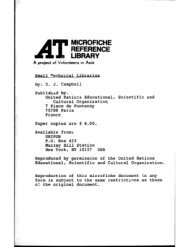
![Mum, int. [man] - Cd3wd.com](https://img.yumpu.com/51564724/1/190x134/mum-int-man-cd3wdcom.jpg?quality=85)
